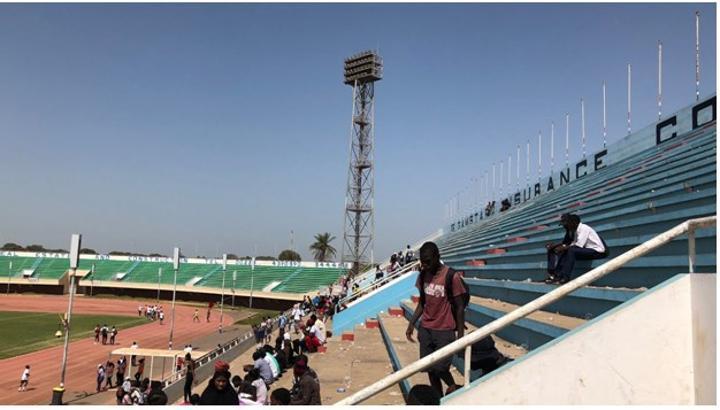Africa-Press – Gambia. Football in The Gambia stands at a pivotal moment. Despite the passion of our fans, the talent of our players and the potential of our national teams, our journey to football excellence continues to be undermined by one critical deficiency: the absence of a functional, Caf- and Fifa-compliant home stadium.
The Independence Stadium, once a symbol of national pride, remains unfinished, outdated, and below international standards—forcing our teams to play their ‘home’ matches abroad.
Gambian football star Musa Barrow recently articulated what many players and supporters have felt for years: “We’re not playing at home, and it’s affecting us a lot. Not having a home ground in these Afcon and World Cup qualifiers hurt us. When we play at home, we have a better chance to win and qualify.”
Home advantage: A strategic necessity
Home advantage in football is more than symbolic — it is a competitive necessity. Playing in front of passionate supporters boosts morale, enhances tactical confidence, and influences match outcomes. It also relieves the logistical and financial strain associated with hosting matches abroad. Currently, The Gambia forfeits these benefits by playing in Morocco or Kenya, Tanzania or Senegal incurring significant costs for travel, accommodation and logistics — resources that could otherwise support training, player welfare and infrastructure development.
A national call to action
The government, Gambia Football Federation (GFF), the Gambia National Olympic Committee ( GNOC) the Gambia Chamber of Commerce and Industry ( GCCI) private sector, Gambian diaspora and development partners must work together to fast-track the completion of The Independence Stadium and a new national stadium and stadia in schools. This should include establishing a high-level task force to oversee the project, engaging Caf and Fifa for technical and financial support and leveraging public-private partnerships to mobilise additional funding.
Building beyond the Stadium: Grassroots and talent pipelines
A modern stadium is essential but not sufficient. The Gambia must also invest heavily in grassroots sports development, school competitions and football academies because these are the breeding grounds for future stars. Funding, coaching and technical support must be prioritised to create a sustainable talent pipeline. In addition, our national teams must have access to regular international friendlies, advanced training camps and high-performance facilities to prepare effectively for tournaments.
Financing a sustainable future for football
To ensure long-term success, The Gambia should establish a National Sports Development Fund dedicated to infrastructure maintenance, athlete training and international participation. Financing can be drawn from a mix of public budget allocations, private sponsorships, diaspora bonds, sports infrastructure treasury bills, and so forth.
Conclusion: From aspiration to action
Musa Barrow’s words are more than a reflection — they are a call to action. Repairing The Independence Stadium and strengthening grassroots development will lay the foundations for sustainable football success. Sports are not just entertainment; they are a catalyst for national unity, youth empowerment, economic growth, and global recognition. By acting now, The Gambia can transform its football future — inspiring a new generation of athletes and fans and positioning our nation as a competitive force in African and global football.
For More News And Analysis About Gambia Follow Africa-Press






